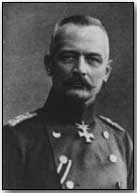Primary Documents - The Battle of the Yser by Erich von Falkenhayn, October 1914
 Reproduced below is an
account of the
Battle of the Yser by German
Army Chief of Staff
Erich von Falkenhayn.
Reproduced below is an
account of the
Battle of the Yser by German
Army Chief of Staff
Erich von Falkenhayn.
In his summary of the battle von Falkenhayn explains how the battle was eventually called off following the Belgian decision to open the sluices of the Yser Canal in late October 1914.
The Battle of the Yser
by Erich von Falkenhayn
In Flanders the enemy's attempts at envelopment were repulsed at the end of September and the beginning of October, but the German enveloping movement was not realized. This had been prevented by the superiority of the French network of railways.
Although very considerable forces had been employed meanwhile, as, for instance, the bulk of the Second Army from the Rheims area, the Sixth Army, which had hitherto been employed in Lorraine, and strong cavalry detachments, which were pushed forward in a wide circle round the northern wing, the German front did not progress beyond a line west of Roye, west of Bapaume, and west of Lille.
The coast on which the right flank was to rest, and from which it was hoped to obstruct England's Channel traffic, effectively attack the Island itself, and turn the French flank, was not reached.
In order to compel this end, a new Fourth Army was formed in Belgium towards the middle of October out of three divisions of the besieging troops from Antwerp, who had been set free by the fall of the fortress on the 9th of the month after a siege of barely twelve days, and four army corps from Germany which had just become fit for service, under the command of General Duke Albert of Wurttemberg, with Colonel Ilse as Chief of Staff.
It was ordered to advance against the Yser sector with its right flank resting on the sea. At the same time from the Sixth Army an attacking group concentrated north of Lille, the former right wing of the German front in Flanders, was to attack straight ahead west of Lille.
The prize to be won was worth the stake. Strong French and English forces had already reached the Yser during the first ten days of October - the English had been withdrawn altogether from the old front near Rheims - and were trying to get into touch on the eastern bank with the Belgian divisions which were retreating from Antwerp.
Our forces had not been sufficient to prevent the withdrawal of these troops before the fall of the fortress. Although the Belgians were in an extremely miserable condition they would soon be able to attack again if supported by English or French formations.
There was no doubt about the resolute offensive intentions of the English and the French. Not only had the danger that the Germans would be finally cut off from the Belgian coast again become acute, but also the danger of an effective encirclement of the right wing.
They both had to be removed unconditionally. If this, at least, was not done, then the drastic action against England and her sea traffic with submarines, aeroplanes and airships, which was being prepared as a reply to England's war of starvation, was impossible in their present stage of development.
It was also questionable in certain circumstances whether the occupied territory in Northern France and Western Belgium was to be held; the loss of it would necessarily have led to evil results.
If, on the other hand, the German Army succeeded in throwing the enemy back across the Yser sector and in following him, it could expect to force a favourable change in the whole situation on the Western front after the supplies of troops and ammunition had been meanwhile replenished.
The enemy's offensive was completely broken. He was thrown back almost everywhere either to, or across, the Yser, and a firm connection was established between the coast at Nieuport and the previous German right wing near Lille, thus forming a front from the Swiss frontier to the sea.
That which had to be attained under any circumstances, if the war was to be carried on with any hopeful prospects, was attained.
Several times it seemed as though it only needed perseverance in the offensive to obtain a complete success - how near we actually were to it has since been made sufficiently plain. At the time, however, our movement came to a standstill.
Inundations, skilfully managed by the Belgians, put an end to the attack of the German right wing, which was making good progress and bore the main pressure. The young army corps further south fought with incomparable enthusiasm and unexcelled heroism. The disadvantages of their urgent and hasty formation and training, and the fact that they were led by older and for the most part retired officers, as others were not to be had, naturally made themselves felt.
In particular there were deficiencies in the new field-artillery formations, a fact that was emphasized all the more strongly by the shortage of ammunition. Nor was the leadership entirely satisfactory.
At the beginning of November, G.H.Q. could not conceal from itself that a further thorough-going success was no longer to be obtained here, particularly in the inundated area, in the face of an opponent who was continually growing stronger.
Source: Source Records of the Great War, Vol. II, ed. Charles F. Horne, National Alumni 1923
Duck-Boards comprised slatted wooden planking used for flooring trenches or muddy ground.
- Did you know?
